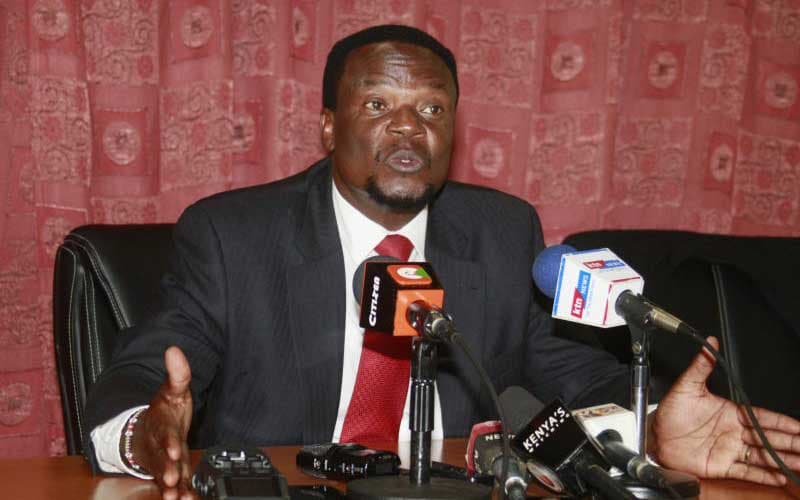We're loading the full news article for you. This includes the article content, images, author information, and related articles.
The Court of Appeal has blocked a Sh1 billion payout to a company linked to Sirisia MP John Waluke, citing fraud allegations. The landmark ruling protects public funds and remits the two-decade-long dispute back to the High Court for fresh scrutiny.

The Court of Appeal on Friday, November 7, 2025, blocked a potential Sh1 billion payout from the National Cereals and Produce Board (NCPB) to Erad Supplies and General Contractors Limited, a company co-owned by Sirisia Member of Parliament John Waluke. The appellate court set aside a 2011 High Court decision that had upheld a substantial arbitration award to Erad, ordering the case to be reheard due to serious allegations of fraud. This ruling is a pivotal moment in a legal battle spanning over two decades and represents a significant victory for Kenyan taxpayers and anti-corruption agencies.
The dispute originates from a 2004 contract where Erad was to supply 40,000 metric tons of maize to the NCPB to mitigate a national food shortage. Erad failed to deliver the maize, claiming that the NCPB breached the contract by not issuing a letter of credit. The matter went to an arbitrator who, in 2009, ruled in favour of Erad, awarding the company damages for breach of contract. The initial award of approximately Sh400 million ($3.1 million) had, with accrued interest, ballooned to over Sh1 billion by April 2025, according to NCPB filings.
The NCPB, supported by the Ethics and Anti-Corruption Commission (EACC), has consistently argued that the arbitration award was obtained fraudulently. A central point of contention is an invoice for over $1.14 million (approximately Sh100 million at the time) for alleged maize storage costs. Erad claimed it had contracted a South African firm, Chelsea Freight Limited, to store the maize in Djibouti.
However, investigations by the EACC, which included mutual legal assistance from South African authorities, revealed that Chelsea Freight denied any involvement in the transaction. Evidence presented indicated that the invoice was a forgery and that Chelsea Freight was involved in air transport, not grain storage. The Court of Appeal found that the High Court had previously failed to adequately scrutinize these serious fraud allegations, which was a key reason for remitting the case for a fresh hearing.
This civil dispute has run parallel to a high-profile criminal case against Mr. Waluke and his business partner, Grace Wakhungu. In June 2020, they were convicted of several charges, including uttering a false document and fraudulent acquisition of public property, related to the same NCPB deal. They were found to have illegally received approximately Sh300 million from the NCPB based on the forged invoice. The Anti-Corruption Court sentenced them to lengthy prison terms of 67 and 69 years respectively, with the option of paying fines exceeding Sh1 billion each.
The High Court upheld this conviction in October 2022, with Justice Esther Maina stating the sentences were deserved as the accused had taken advantage of a national crisis for personal gain. However, in a dramatic turn in October 2024, the Court of Appeal overturned the criminal convictions and sentences, ruling that the High Court had not properly analyzed the evidence. Despite this acquittal in the criminal case, the appellate court in the separate civil appeal has now determined that the underlying fraud allegations in the contractual dispute are substantial enough to warrant a new hearing.
The Court of Appeal's latest decision on Monday, November 10, 2025, has significant implications for the fight against corruption and the protection of public resources in Kenya. By blocking the Sh1 billion payout and sending the case back to the High Court, the judiciary has underscored the principle that public policy can be grounds to challenge arbitral awards tainted by fraud. The ruling reinforces the EACC's role in investigating and presenting evidence in civil matters where public funds are at risk.
For the NCPB, a state corporation crucial for Kenya's food security, the decision averts a massive financial loss that could have crippled its operations. The case highlights the vulnerabilities in public procurement and contracting processes and serves as a precedent for scrutinizing claims against government agencies that may be founded on fraudulent activities. The fresh hearing at the High Court will be closely watched, as it will re-examine the evidence of forgery and determine the legitimacy of Erad's long-standing claim once and for all.
Keep the conversation in one place—threads here stay linked to the story and in the forums.
Other hot threads
E-sports and Gaming Community in Kenya
Active 8 months ago
The Role of Technology in Modern Agriculture (AgriTech)
Active 8 months ago
Popular Recreational Activities Across Counties
Active 8 months ago
Investing in Youth Sports Development Programs
Active 8 months ago
Key figures and persons of interest featured in this article